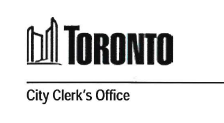
August 1, 2018
SENT VIA E-MAIL
To: Interested Parties
Subject: Toronto Overdose Action Plan, Status Report 2018 (Item HL27.1)
The Toronto Board of Health, during its meeting on June 18, 2018, adopted Item HL27.1, as amended, and:
- Directed that the Board of Health’s decision and the report (June 4, 2018) from the Medical Officer of Health be forwarded to all Boards of Health in Ontario for information.
- Reinforced with provincial and federal governments the urgency of the opioid poisoning emergency, and the critical need to scale up actions in response.
- Urged the Ministry of Health and Long-Term Care to extend approval of the maximum term for overdose prevention sites from the current 6 months to a 12-month period.
- Urged the Ministry of Health and Long-Term Care to support urgent implementation of managed opioid programs (i.e., pharmaceutical heroin/diacetylmorphine and/or hydromorphone), including low-barrier options, across Ontario.
- Reaffirmed its support for a comprehensive, evidence-based response to the opioid overdose crisis that includes prevention, harm reduction, and treatment and, in particular, the critical role that harm reduction measures such as naloxone distribution, peer support, supervised consumption services, and overdose prevention sites, play in saving lives and improving health.
- Requested that the Medical Officer of Health review the communications and public presentations received at the Board of Health meeting on June 18, 2018 for consideration as to the next steps in developing the Toronto Drug Strategy.
Toronto City Council, during its meeting on June 26-29, 2018, also:
- Reaffirmed its support for a comprehensive, evidence-based response to the opioid overdose crisis that includes prevention, harm reduction, and treatment and, in particular, the critical role that harm reduction measures, such as naloxone distribution, peer support, supervised consumption services, and overdose prevention sites, play in saving lives and improving health.
- Called on the Province of Ontario to continue its response to the opioid overdose crisis by supporting and expanding existing provincially-funded prevention, harm reduction, and treatment measures in the City of Toronto.
- Requested the Medical Officer of Health to work with the Toronto Community Housing Corporation to train their staff on the safe disposal of drug use equipment and actively participate in the safe disposal of this equipment.
- Requested the Toronto Community Housing Corporation to require their staff to receive overdose training from Toronto Public Health staff.
- Requested the Toronto Community Housing Corporation to urgently review their current policies that discriminate against people who use drugs and implement a moratorium on evicting tenants based on drug use during the opioid poisoning crisis.
To view this item and background information online, please visit:
http://app.toronto.ca/tmmis/viewAgendaItemHistory.do?item=2018.HL27.1.
Sincerely,
Julie Lavertu/ar
Secretary
Board of Health
Sent to the following Boards of Health in Ontario (via e-mails to the Public Health Units):
• Algoma Public Health Unit
• Brant County Health Unit
• Chatham-Kent Health Unit
• Durham Region Health Department
• Eastern Ontario Health Unit
• Grey Bruce Health Unit
• Haldimand-Norfolk Health Unit
• Haliburton, Kawartha, Pine Ridge District Health Unit
• Halton Region Health Department
• City of Hamilton Public Health Services
• Hastings Prince Edward Public Health Unit
• Huron County Health Unit
• Kingston, Frontenac, Lennox & Addington Public Health
• Lambton Public Health
• Leeds, Grenville and Lanark District Health Unit
• Middlesex-London Health Unit
• Niagara Region Public Health Department
• North Bay Parry Sound District Health Unit
• Northwestern Health Unit
• Ottawa Public Health
• Oxford-Elgin-St. Thomas Public Health Unit
• Peel Public Health
• Perth District Health Unit
• Peterborough Public Health
• Porcupine Health Unit
• Public Health Sudbury & Districts
• Renfrew County and District Health Unit
• Simcoe Muskoka District Health Unit
• Thunder Bay District Health Unit
• Timiskaming Health Unit
• Region of Waterloo, Public Health
• Wellington-Dufferin-Guelph Public Health
• Windsor-Essex County Health Unit
• York Region Public Health
cc (via e-mail):
• Dr. Eileen de Villa, Medical Officer of Health, Toronto Public Health
• Elena Zeppieri, Administrative Assistant to the Medical Officer of Health, Toronto Public Health
